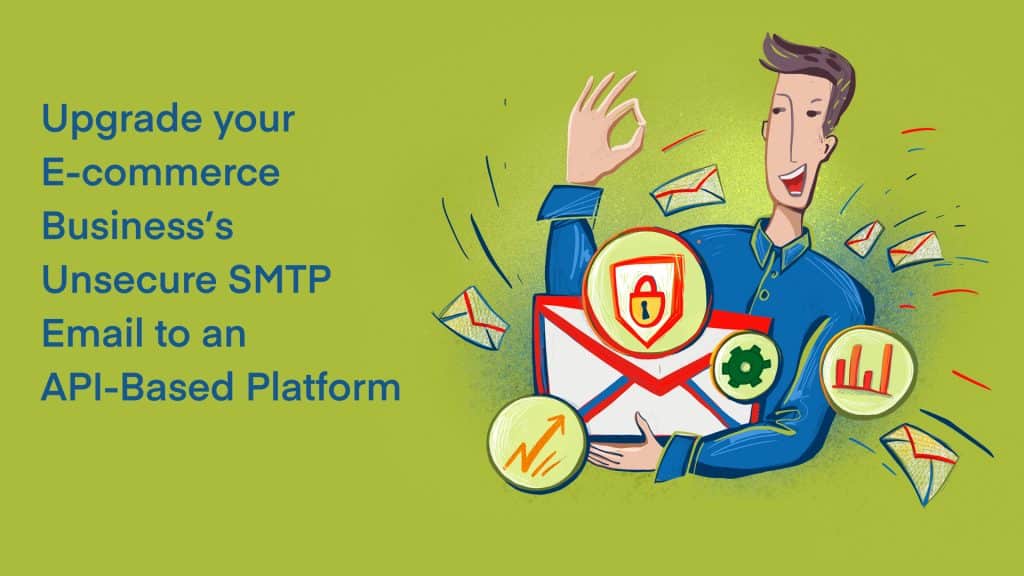
There are two main methods for transmitting an email: a Simple Mail Transfer Protocol (SMTP) and an Application Programming Interface (API). Both allow you to send and receive emails between customers, marketplaces, and your team, but a web-based API email platform has several key benefits over the aging SMTP relay:
- Better security.
- Faster transfer speeds.
- Greater reliability.
- Enhanced data collection and automation capabilities.
If your ecommerce business is running its emails on SMTP relays, your messages may not be getting through as effectively as you’d like. Moreover, you may miss out on a host of features and analytics that are only possible with an API-based email platform.
Industries are Moving Away from SMTP Due to Security Concerns – So Should You
While SMTP has been an email standard since the early days of the Internet, it has begun to lose favor, particularly when it comes to data security. Every time an email is sent using SMTP, the email client and the server must communicate back and forth several times.
Each of these communications returns a message that the process is either a success or there is an error. Each of these communications is also unsecured and susceptible to being intercepted by a bad actor.
Think about all the information that your ecommerce business transmits through email:
- Internal communications with your team may include trade secrets, critical product information, accounting data, or personnel records.
- Communications with your vendors, suppliers, and marketplaces outlining sensitive agreements and payment information, among other things.
- Customer information, such as email addresses, physical addresses, order numbers, payment methods, or any other identifying data.
An SMTP breach could potentially give attackers access to all of this, and a data breach of any information could be catastrophic to your brand. Commonly, hackers will leverage an SMTP attack to do one of the following:
- Launch a Denial of Service (DoS) attack that cripples the network of your business and/or email recipients.
- Send malicious emails from your domain to either spam customers’ inboxes or commit fraud by getting recipients to volunteer sensitive information about their account and/or payment details.
- Spread viruses by convincing unsuspecting recipients to open infected files.
While innovations in end-to-end encryption have helped secure SMTP transmissions, true protection requires complicated add-ons like Transport Layer Security (TLS) or Multipurpose Internet Mail Extensions (MIME).
When combined with SMTP, each has flaws that can still leave email data exposed—especially if both the sender and recipient are not using the same protection protocols. Conversely, web APIs can be a much more secure email option. APIs handle the entire sending and receiving process with a persistent HTTP connection.
The complete back-and-forth communication between the sender and the receiving ISP happens through this single channel. These connections are created using a unique API key—a special authentication token separate from your login credentials.
This makes it that much harder to breach the data being transmitted between the email client and the recipient. Similarly, API connections allow users to add two-factor authentication (2FA) to their accounts and programs.
This gives users the option to further protect their accounts by requiring verification through secondary applications and/or devices before allowing a login or email transmission.
With Memaila—Descartes Sellercloud’s own email and collaboration tool—shifting to an API-based delivery system has opened the door to allowing 2FA support for both Google App and Office365 applications (for Gmail-based accounts and Outlook-based accounts, respectively).
We know that the security of your ecommerce business and your customers matter. API has proven to be the optimal way to protect both.
API-Based Email is the Fastest Option for Bulk Email Transfers
Email security is paramount, but so is speed. Ecommerce businesses often have the need to send emails to bulk lists of recipients. Whether it’s a flurry of tracking updates or a mail merge marketing campaign, a well-designed web API can perform these tasks faster and in fewer steps than an SMTP relay can.
Again, emailing with SMTP requires repeated chatter between the client and the server. Sure, this process is quick when sending a few emails at a time, but this delay multiplies as the sender list grows.
On the other hand, an API’s secured communication channel helps ensure information gets through while also maximizing potential data. There is no per-message latency to contend with. The result is a faster, more reliable transmission with fewer possible failure points.
Not only that, but email APIs typically receive updates that can continually improve efficiency and security. Simply put, trading your SMTP-based email for an API-based system like Memaila can help ensure your emails always reach their destinations quickly and safely.
API Emails Are Less Likely to Get Blocked by Firewalls Than Emails Sent with SMTP
When you send an email, you need to be confident that it will reach its recipient. Due to the rising security and spam concerns over SMTP, many ISPs and firewall programs are starting to block the default ports used by SMTP relays.
If you try to send an email to a recipient behind one of these barriers, you will receive errors and delivery failures. API’s get around this issue by using secured HTTP ports (typically HTTPS port 443).
While some firewalls block SMTP ports, hardly any block HTTP, the application layer protocol that is the foundation of the World Wide Web. This gives API-based email platforms yet another clear edge over SMTP-reliant options.

API’s Open the Door to Brand-Boosting Email Automations, Data Collection, and Analytics
Beyond safety and efficiency, API-based email platforms open the door to several useful features not natively available in SMTP-based email:
- Mass-mailing from directly within applications and platforms.
- Creating and maintaining automated email processes.
- Generate useful data on email engagement (e.g., who interacted with an email and how).
These abilities can be a significant asset to a growing ecommerce business. Not only can they help reduce the time spent manually managing and sorting email processes, but they can also provide actionable insights into the effectiveness of your email communications.
All told, the benefits and versatility of API-based email are outpacing the limitations of SMTP. The security and functionality of an API platform are things every ecommerce business can benefit from.
As part of our dedication to keeping your email and data secure, we are replacing SMTP in Descartes Sellercloud with our API-based Memaila communication platform. Along with a bevy of integrated time-saving and automation tools, Memaila provides reliable security and authentication features to keep your and your customers’ information safe.
Contact us for a free demo of how Memaila and its API-based toolset can help streamline your ecommerce business’s communications workflows.




